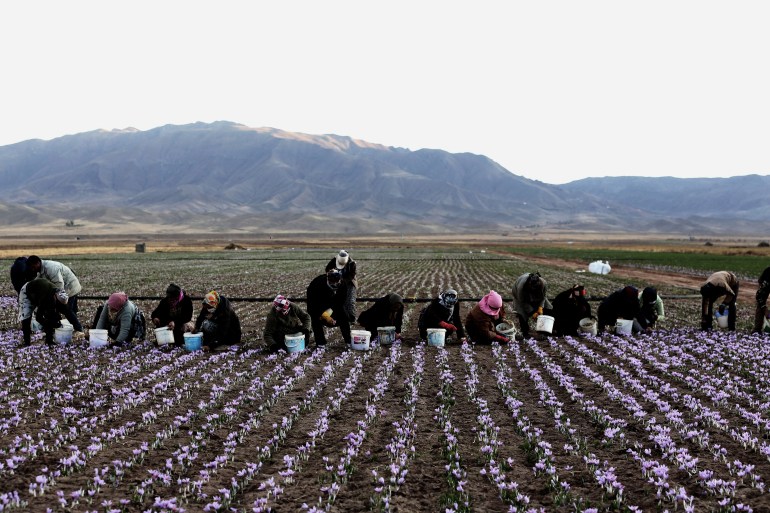In light of expectations that a global food crisis will erupt due to the repercussions of the Russian-Ukrainian war, the specter of a shortage of wheat supplies prompted the Iranian government to think of solutions to ensure its food security, which has already been threatened for years by water scarcity.
After Tehran has repeatedly celebrated achieving self-sufficiency in wheat production, it was forced to import it in large quantities in 2014 and 2020, according to customs spokesman Ruhollah Latifi, who confirmed that his country imported more than 7 million tons of wheat during the past Iranian year (end March 20). last March).
Latifi revealed - to Al Jazeera Net - that Iran classifies 25 commodities as basic commodities, including wheat, barley, rice, corn, sugar, oilseeds and tea, adding that his country is an exporter and importer at the same time for some of these commodities according to quality and seasons of consumption and production.
In addition to planning to raise national production of wheat and strategic grains, Tehran sees agricultural integration with countries rich in water resources as a way out of the food gap crisis.
In the context of forming agricultural alliances outside its borders, Iran hastened its steps to implement strategic plans to avoid the food crisis. Last weekend, it hosted a Russian delegation with a proposal to cultivate the Iranian side on 100,000 hectares of the territory of the Russian Republic of Bashkortostan.
farming abroad
Head of the Russian trade delegation, Sergey Grikov, announced, from the headquarters of the Tehran Chamber of Commerce and Industry, his country's readiness to provide the necessary capabilities to Iranian companies for agriculture on Russian soil, noting that they are available to the Iranian side to invest in the production of meat and sunflower oil.
On the other hand, the Iranian side - through the assistant for international affairs in the Tehran Chamber of Commerce Hossam Eddin Hallaj - welcomed the Russian proposals and demanded to raise the level of trade cooperation between the two sides, noting that the value of Iranian exports to Russia did not exceed one billion dollars, while Iranian imports from this country amounted to 3 Billions.
Iran sees agricultural integration with countries rich in water resources as a way out of the food gap crisis (Shutterstock)
advance planning
The Iranian official indicated, in press statements, to the challenges facing the Iranian agricultural sector in Afghanistan, especially in financial exchanges, and expressed his hope that these obstacles would be overcome in dealing with Russia due to the banking cooperation between the two countries, stressing that Tehran is continuing the project to grow corn on Russian soil. It is scheduled to import the first shipments of its crops after 4 months.
He revealed an Iranian-Russian agreement two months ago regarding agriculture on Russian lands, stressing that the government had put cross-border agriculture on its agenda.
In this context, Ali Radwanizadeh, Chairman of the Board of Trustees of the Iranian Association of Transboundary Agriculture, revealed that the Ministry of Agricultural Jihad had taken practical steps during the period 2016 to 2020 in Kazakhstan, Ukraine, Ghana, Azerbaijan and other countries.
Radwanizadeh described agriculture abroad as one of the ways to achieve a resistance economy, and criticized his country's delay in implementing its agricultural projects outside the borders, despite the fact that it had enacted the necessary laws in the Ministerial Council earlier.
He revealed a difference in the views of the government and private sectors regarding agriculture abroad, explaining that the Ministry of Economy prefers investing in the green continent, while the private sector wants to farm in Russia, Kazakhstan, Venezuela and some African countries, for reasons including geographical proximity and reducing expenditures, which led to the delay in Implementation of agricultural projects abroad.
agricultural investments
In order to overcome the specter of a lack of food supplies, Iranian economist Mohsen Mirzai reveals the government's tendency to address the food crisis at home and abroad, explaining that the Ministry of Agricultural Jihad has already started contracting with a number of local farmers to grow strategic grains, especially wheat, and ensured the purchase of crops at prices relatively high.
Speaking to Al-Jazeera Net, he criticized his country's delay in implementing seawater desalination projects to cultivate the vast areas of southern and central lands of the country, and expressed his hope that the global food crisis would push the government to address the phenomenon of water scarcity by implementing seawater desalination projects.
Mirzai described cross-border agriculture as fraught with challenges, including outbreaks of diseases, wars and sanctions, adding that his country sees itself compelled to continue agricultural projects abroad to ensure its food security and supplement its beleaguered economy by exporting its surplus.
He added that farming projects abroad are not limited to cultivating strategic grains, but rather there are other projects for livestock and meat production, stressing that farming abroad has already proven its effectiveness in supplying the country with the foodstuffs that citizens need despite the failures it faced in some African countries, especially during the outbreak of Ebola.
Mirzai stressed the need to present the issue of agriculture abroad to Parliament, because the enactment of laws in the Ministerial Council does not provide full support for its implementation, explaining that the government, due to the lack of sufficient budget allocation, did not provide support - during the last period - except for the cultivation of corn, soy, barley and oilseeds.

